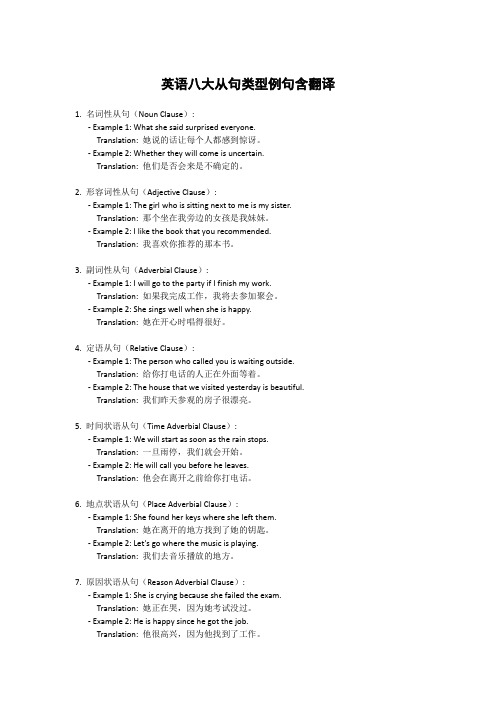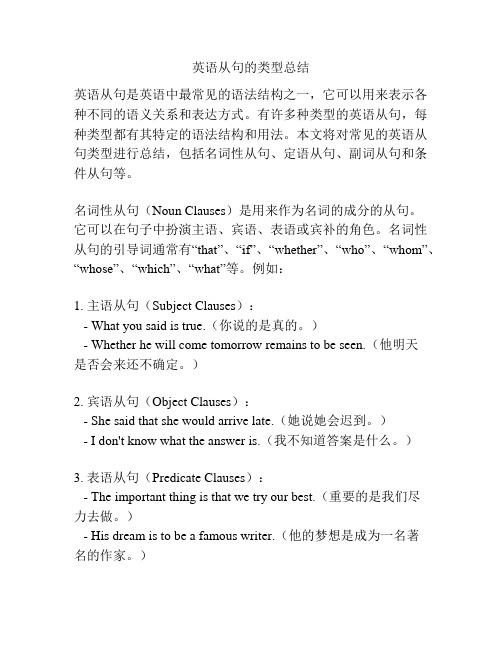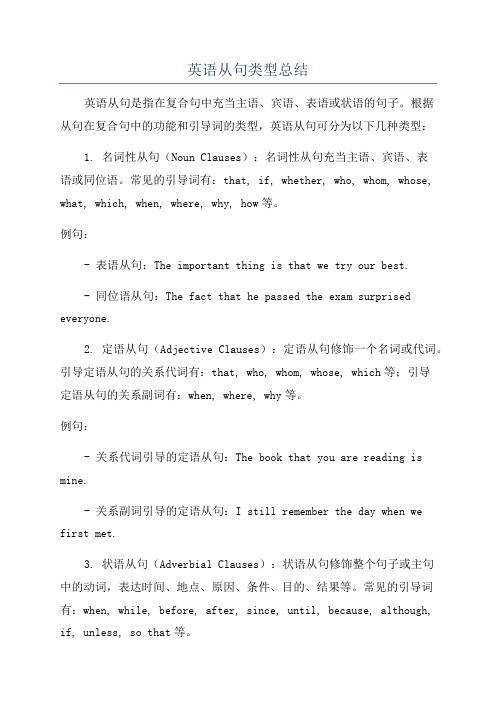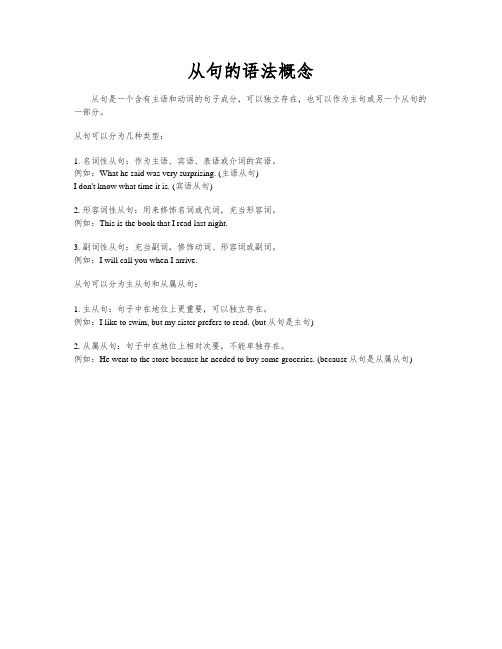英语所有从句类型举例
语法进阶从句的各种类型

语法进阶从句的各种类型语法进阶: 从句的各种类型从句是句子中的一种构成成分,它是一个完整的句子,包含主语和谓语,并在句子中承担特定的语法功能。
掌握不同类型的从句对于提升语言表达能力至关重要。
本文将介绍从句的各种类型,并提供例句帮助读者更好地理解和运用。
1. 名词性从句名词性从句在句子中担任名词的功能,可以作为主语、宾语、表语或补语。
名词性从句常见的类型有:主语从句、宾语从句、表语从句和同位语从句。
主语从句:主语从句用作主语,引导词可以是“that”、“whether”、“if”等等。
例句:Whether he will come to the party is still uncertain.宾语从句:宾语从句用作谓语动词的宾语,引导词可以是“that”、“whether”、“if”等等。
例句:I believe that you will succeed.表语从句:表语从句用作表语,通常以“是”或“似乎”等动词引导。
例句:The fact is that we are running out of time.同位语从句:同位语从句用来解释或说明名词的含义。
例句:The news that she passed the exam made us jubilant.2. 定语从句定语从句用来修饰名词或代词,对其进行进一步的说明或限定。
常见的引导词有“that”、“which”、“who”、“whom”、“whose”等等。
例句:The book that I borrowed from the library is very interesting.3. 状语从句状语从句用来修饰动词、形容词、副词或全句,表示时间、地点、原因、条件、方式等关系。
常见的引导词有“when”、“where”、“why”、“if”、“although”等等。
例句:He went to bed after he finished his homework.4. 同位语从句同位语从句通常紧跟在某些抽象名词(如“事实”、“观点”、“信念”)后面,用来解释或说明这些名词的具体内容。
英语八大从句类型例句

英语八大从句类型例句含翻译1. 名词性从句(Noun Clause):- Example 1: What she said surprised everyone.Translation: 她说的话让每个人都感到惊讶。
- Example 2: Whether they will come is uncertain.Translation: 他们是否会来是不确定的。
2. 形容词性从句(Adjective Clause):- Example 1: The girl who is sitting next to me is my sister.Translation: 那个坐在我旁边的女孩是我妹妹。
- Example 2: I like the book that you recommended.Translation: 我喜欢你推荐的那本书。
3. 副词性从句(Adverbial Clause):- Example 1: I will go to the party if I finish my work.Translation: 如果我完成工作,我将去参加聚会。
- Example 2: She sings well when she is happy.Translation: 她在开心时唱得很好。
4. 定语从句(Relative Clause):- Example 1: The person who called you is waiting outside.Translation: 给你打电话的人正在外面等着。
- Example 2: The house that we visited yesterday is beautiful.Translation: 我们昨天参观的房子很漂亮。
5. 时间状语从句(Time Adverbial Clause):- Example 1: We will start as soon as the rain stops.Translation: 一旦雨停,我们就会开始。
英语从句的类型总结

英语从句的类型总结英语从句是英语中最常见的语法结构之一,它可以用来表示各种不同的语义关系和表达方式。
有许多种类型的英语从句,每种类型都有其特定的语法结构和用法。
本文将对常见的英语从句类型进行总结,包括名词性从句、定语从句、副词从句和条件从句等。
名词性从句(Noun Clauses)是用来作为名词的成分的从句。
它可以在句子中扮演主语、宾语、表语或宾补的角色。
名词性从句的引导词通常有“that”、“if”、“whether”、“who”、“whom”、“whose”、“which”、“what”等。
例如:1. 主语从句(Subject Clauses):- What you said is true.(你说的是真的。
)- Whether he will come tomorrow remains to be seen.(他明天是否会来还不确定。
)2. 宾语从句(Object Clauses):- She said that she would arrive late.(她说她会迟到。
)- I don't know what the answer is.(我不知道答案是什么。
)3. 表语从句(Predicate Clauses):- The important thing is that we try our best.(重要的是我们尽力去做。
)- His dream is to be a famous writer.(他的梦想是成为一名著名的作家。
)4. 宾补从句(Complement Clauses):- I made a promise that I would help him.(我承诺会帮助他。
) - They declared him to be the winner.(他们宣布他是胜利者。
)定语从句(Adjective Clauses)是用来修饰名词或代词的从句。
它通常位于被修饰的名词或代词之后,并用来限定或描述该名词或代词。
英语六种从句的类型

英语六种从句的类型
英语六种从句类型包括:
1、定语从句:用来修饰名词或代词,由关系代词或关系副词引导,例如:That is the man who helped me.
2、状语从句:用来改变句子的时态、语义或解释句子的内容,常由连接副词或连词引导,例如:He went there because he had important business.
3、表语从句:用来修饰主语,经常跟在be动词后面,由连接代词或连词引导,例如:I know that he is a doctor.
4、宾语从句:可以作实义动词或介词的宾语,常由连接代词或连词引导,例如:He said that he was very busy.
5、同位语从句:可以作名词的补充说明,由连接代词或连词引导,例如:Do you know the fact that he is ill?
6、主语从句:可以作谓语动词的主语,常由连接词或连接副词引导,例如:Whether they will come or not is uncertain.。
英语从句类型总结

英语从句类型总结英语从句是指在复合句中充当主语、宾语、表语或状语的句子。
根据从句在复合句中的功能和引导词的类型,英语从句可分为以下几种类型:1. 名词性从句(Noun Clauses):名词性从句充当主语、宾语、表语或同位语。
常见的引导词有:that, if, whether, who, whom, whose, what, which, when, where, why, how等。
例句:- 表语从句:The important thing is that we try our best.- 同位语从句:The fact that he passed the exam surprised everyone.2. 定语从句(Adjective Clauses):定语从句修饰一个名词或代词。
引导定语从句的关系代词有:that, who, whom, whose, which等;引导定语从句的关系副词有:when, where, why等。
例句:- 关系代词引导的定语从句:The book that you are reading is mine.- 关系副词引导的定语从句:I still remember the day when we first met.3. 状语从句(Adverbial Clauses):状语从句修饰整个句子或主句中的动词,表达时间、地点、原因、条件、目的、结果等。
常见的引导词有:when, while, before, after, since, until, because, although, if, unless, so that等。
例句:- 时间状语从句:I will call you when I arrive.- 结果状语从句:She studied hard so that she could pass the exam.例句:- He is not as tall as his brother.5. 让步状语从句(Concessive Clauses):表示一种让步关系,常见的引导词有:although, though, even though, while等。
从句的类型及用法总结

从句的类型及用法总结从句是语言中的一种基本成分,它可以扩展句子的信息量,并使句子更加具体和明确。
从句分为几种类型,包括名词性从句、形容词性从句和副词性从句。
本文将对这些从句的类型及其用法进行总结,并举例说明。
一、名词性从句名词性从句可以在句子中充当主语、宾语、表语或宾语补足语。
名词性从句通常由连接词“从属连词”引导,包括“that、whether/if、who、whom、whose、which、what”等。
1. 主语从句主语从句在句子中充当主语,常以“that、whether/if、wh-”为引导词。
例如:- That he has refused to help surprises me. (他拒绝帮助我,让我感到惊讶)- Whether she will come or not is still uncertain. (她是否会来还不确定) - What he said is true. (他说的是真的)2. 宾语从句宾语从句在句子中充当直接宾语或间接宾语,常以“that、whether/if、wh-”为引导词。
例如:- He knows that you are coming. (他知道你要来了)- I wonder if he can finish the task. (我想知道他是否能完成这个任务) - I don't know what he is talking about. (我不知道他在说什么)3. 表语从句表语从句在句子中充当表语,常以“that、whether/if、wh-”为引导词。
例如:- My wish is that you succeed. (我希望你成功)- The fact that he lied shocked everyone. (他撒谎的事实让每个人都感到震惊)4. 宾补从句宾补从句通常跟在某些动词(如“think、believe、find、consider”等)或介词(如“for、on、about”等)后面,充当宾语的补足语,常以“that、whether/if、wh-”为引导词。
英语从句辨析50个例句

英语从句辨析50个例句英语从句是英语语法中的一个重要部分,主要包括名词性从句、定语从句和状语从句。
以下是50个例句,用于帮助辨析不同类型的英语从句:一、名词性从句1、主语从句:What he said is not true.(他说的不是真的。
)2、宾语从句:I don't know if he will come.(我不知道他是否会来。
)3、表语从句:The question is who will go there.(问题是谁会去那里。
)4、同位语从句:The news that he resigned was surprising.(他辞职的消息令人惊讶。
)5、主语从句:Whether he will come or not remains uncertain.(他是否会来还不确定。
)6、宾语从句:I doubt whether he can finish the task on time.(我怀疑他是否能按时完成任务。
)7、表语从句:The question is when we should start the project.(问题是我们应该何时开始这个项目。
)8、同位语从句:The fact that she won the prize was a great honor for her family.(她获奖的事实对她家来说是一种极大的荣誉。
)9、The question whether we should proceed with the project remains unanswered. (我们是否应该继续这个项目的问题尚未回答。
)10、It's a fact that the company is going through a tough period. (公司正在经历困难时期,这是事实。
)11、The reason why he resigned was not made public. (他辞职的原因没有公开。
从句的语法概念

从句的语法概念
从句是一个含有主语和动词的句子成分,可以独立存在,也可以作为主句或另一个从句的一部分。
从句可以分为几种类型:
1. 名词性从句:作为主语、宾语、表语或介词的宾语。
例如:What he said was very surprising. (主语从句)
I don't know what time it is. (宾语从句)
2. 形容词性从句:用来修饰名词或代词,充当形容词。
例如:This is the book that I read last night.
3. 副词性从句:充当副词,修饰动词、形容词或副词。
例如:I will call you when I arrive.
从句可以分为主从句和从属从句:
1. 主从句:句子中在地位上更重要,可以独立存在。
例如:I like to swim, but my sister prefers to read. (but从句是主句)
2. 从属从句:句子中在地位上相对次要,不能单独存在。
例如:He went to the store because he needed to buy some groceries. (because从句是从属从句)。
- 1、下载文档前请自行甄别文档内容的完整性,平台不提供额外的编辑、内容补充、找答案等附加服务。
- 2、"仅部分预览"的文档,不可在线预览部分如存在完整性等问题,可反馈申请退款(可完整预览的文档不适用该条件!)。
- 3、如文档侵犯您的权益,请联系客服反馈,我们会尽快为您处理(人工客服工作时间:9:00-18:30)。
在英语中,主要有三大从句
名词性从句(包括主语从句,宾语从句,表语从句,同位语从句)、
形容词性从句(即定语从句)、
副词性从句(即状语从句,包括时间、条件、结果、目的、原因、让步、地点、方式等)。
主语从句:用作主语
eg:Whoever comes is welcome. 不论谁来都欢迎。
宾语从句:用作宾语
eg:Do you know where he lives? 你知道他住在哪吗?
表语从句:用作表语用来说明主语的身份、特征、状态等。
eg:My opinion is that you should work hard. 我的意见是你应该努力工作。
同位语从句:用于解释说明前面的名词
eg:The news that you got the first place is true.你获得了第一名的消息是真的
(that从句用于解释说明the news)
定语从句:相当于一个形容词,用于修饰前面的名词
eg:The student who answered the question was sandy. 回答问题的学生是sandy.
状语从句:相当于一个副词
eg:When it rains, I usually go to school by bus. 天下雨时,我通常坐公共汽车上学。
(时间状语)
If he comes tomorrow, you will see him. 如果他明天来,你就可以看到他了。
(条件状语)
(if 引导的条件状语从句,其结构为:if +状语从句,+主句)。
要注意在状语从句中有一个规则是“主将从现”,即主句是将来时,则从句要用一般现在时表示将来。
